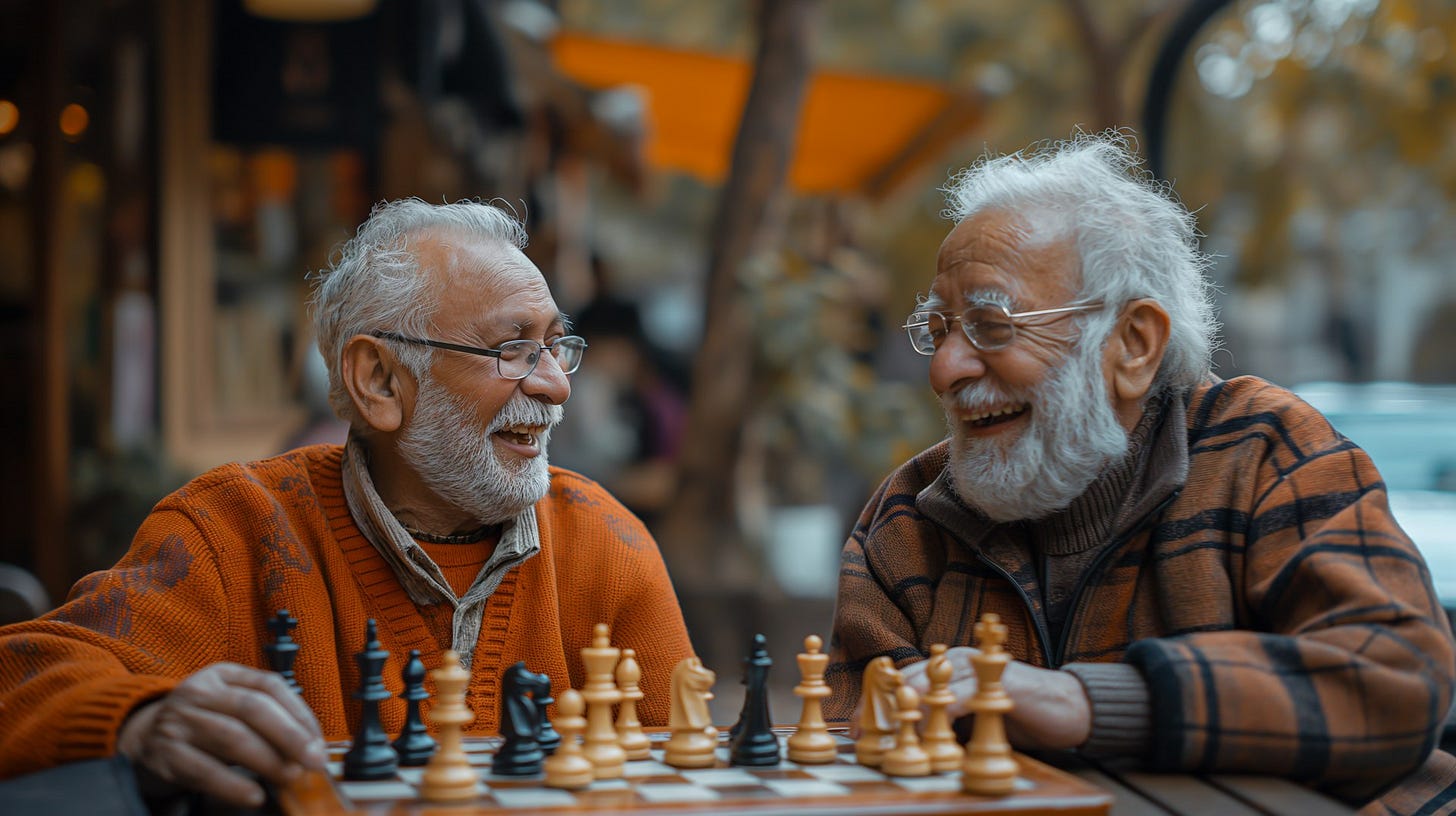Hello
& Welcome ! The Bridge is a newsletter connecting the professional and the personal creatively across cultures and a diversity of topics, until we are not only full of ideas but also ready to take action. Thanks for joining in the conversation.
Can you tell? I enjoy writing to you.
The Bridge has been such a fun way for me to connect with others and to connect dots between my various interests. It’s also something like a love letter to the world, without expectation, and without (undue) pressure.
I didn’t know when I started how long I would do it or how exactly it would evolve, but I knew that it was important to be writing out in the open, trusting that even when you readers are maybe busy or distracted or occupied finding your own way, that my voice could be of value, creating a safety through my willful wandering. My journey shared with you, I see clearly now, is itself a bridge… to another way of seeing.
Something to Consider: It’s Ok to Lose
For some years now I have really enjoyed playing chess, the winning and the losing (LOTS of losing), the learning and improving.
When I was in school I thought chess was interesting, but I was so ashamed at losing and didn’t know that losing would be a critical part of my journey of improvement, so I stopped trying after a while. It wasn’t fun to lose.
Having given it another shot, as a kind of hobby, in the years since the pandemic started (and apparently in good company, because I’ve met many others who took up chess during the pandemic, for one reason or another) — I have accepted that losing is going to happen on the regular.
Primarily I use a tool called Chess.com, and it can automatically based on my skill level match me (rather accurately) with other players around the world who are “ranked” at a similar level to me. For several years I was stuck at the same ranking, because every time I would win a match or two, the algorithms would match me with more challenging opponents and I would lose again, and I couldn’t figure out what I was doing wrong or what it was I needed to learn to get better.
I wasn’t only losing, I was lost. But for some reason, I enjoyed playing anyway, and I kept at it for 2-3 years, not at all improving (in terms of a measurable ranking) but not being discouraged either.
In recent months my ranking (for fast-paced 5-min games) has risen from an average of 450 to an average of 650 (which makes me a formidable opponent, even if it’s a very far cry from tournament-competitive). And I am quite proud of that fact!
During the several years in which my ranking didn’t markably improve, I was in a part of the learning curve that is rather flat. Because when we initially learn something new, it’s often exciting and we can “get it” rather quickly, but then we inevitably hit a flat part of the curve, where it’s pretty difficult to measure what it is we’re learning.
That said, if we quit early, we’ll miss out on some powerful lessons.
Like, commitment and resilience.
Of course, it’s pretty hard to know when we’re supposed to suffer through, slogging through a muddy swamp of uncertainty and self-doubt to attain a goal we haven’t yet fully sorted out yet… and when we do better telling ourselves (perhaps with half-baked confidence) to enjoy the ride, relaxing into an adventure of embarrassing mistakes and unclear objectives, where we just keep trying and trying, hoping to eventually get better. Which should it be? Would we be foolish to enjoy it? Stupid to suffer through? In either case, we could find ourselves looking pretty foolish at the end of it with little to show as a reward.
In general, I’ve found it helpful to be doing this sort of experimenting all of the time, to see what I can learn from going down rabbit holes or enjoying games I lose. But if it takes up too much space in my life (and I’m not spending time creating or processing what I learn), I become totally disoriented. So it’s something to do a little bit every week maybe, but not something I do all day long. Everything it’s proper place. Chess, included.
Something to Hear: Hispanic Poetry
This is Not America by Residente (feat Ibeyi)
French-Cuban sister duo Ibeyi helped me pay closer attention to this song. Because I’ll be first to admit, when a friend recommended this song to me, I hadn’t heard of Residente. I knew what the song title references: It is a response to Childish Gambino’s song “This is America,” which itself speaks about the parts of “America” (meaning, the United States of America) that we might not want to acknowledge, but which are important parts to consider as well.
We cannot pretend that America is the land of the free and the brave, if some Americans cowardly decide to enforce racist positions in vague bureaucratic terms. We cannot claim that America is purely about economic opportunity and capitalistic success, if some Americans are excluded from opportunities because of police violence or racial profiling. That is the message of Childish Gambino’s song.
Residente adds to that message by expanding the definition of “America” to rightly include Latin America (because it’s good to get out of our bubble and see the bigger picture, from time to time). Residente speaks of historical realities in Latin America from the past 50 years that sometimes go under-acknowledged. He helps us to see what we might feel uncomfortable acknowledging.
He writes poetry and raps in Spanish, and maybe that’s why I hadn’t yet heard of him because I’m not fluent in Spanish. But he’s won 4 Grammy’s and 29 Latin Grammy’s besides also being recognized globally as a person committed to social awareness and peace-building. I think it’s OK that I didn’t know before. Thanks to my friends for opening my eyes and ears to Residente.
America is not just the U.S.A., papa /
It runs all the way from Tierra del Fuego to Canada /
You have to be pretty dull, pretty hollow /
It's like saying that Africa is only Morocco. /
These rascals forgot the calendar they use /
Was invented by the Mayas /
With Pre-Columbian Valdivia [an ancient civilization of modern-day Ecuador] long since gone /
This continent is moving /
Here we are, we are always here /
We didn't leave, and we're not leaving /
We’re here to remember you /
but if you want my machete, it'll bite you /
Something to Go Deep Reading: When We Have Enough
Ill With Want by L. M. Sacasas
The essay is long but it draws on the thoughts of social critics writing 50-70 years ago before mass communication technologies had for better or worse derailed certain types of conversation: Namely, if we are to consider what it is to have enough, and we are to admit that we generally struggle nowadays knowing when we have enough and how to stop (stop acquiring, stop consuming, stop looking at screens, stop shopping, stop hustling), because we agree that consumerism is rampant and addiction is encouraged by our current economics, yet we’re at a loss how to go deeply enough with our critiques and appreciations of the current situation, such that we are generally left with rather superficial suggestions (like here in the Washington Post) of how to improve, so then why not seek deeper, more thoughtful explanations?
That said, it can be argued that it’s useful to receive superficial suggestions, such as those proposed in the Washington Post article about making “good enough” decisions because then you’ll be happier (less anxious, less haphazard). Sounds useful, right?
Try making more “good enough decisions” is useful advice, but it’s like swimming up-stream. The advice does not consider adequately enough the systemic roots of the problem (the speed metaphorically at which the current is flowing downstream). The systemic roots of the problem include that we are often presented with too many options, too many customer reviews, too much advertising, too many hot-takes, and so we are primed to make decisions too quickly (rashly) or too slowly (max research). We could become frustrated at ourselves, but what if we looked at it another way: What if we struggle to know what it takes to make “good enough decisions” on a regular basis, not because of a personal failing (lack of discipline) but rather due to the environmental factors, the subliminal training. If so, maybe it’s time we re-think the system that traps us in such a quandry to begin with.
In other words, we have become ill with want (sick with desires for things we do not need or otherwise sick with the illusion that the immaterial needs we have can be met by consuming new technologies) because of an economic system designed to sicken us in this way.
Examples of immaterial needs:
We might need to feel proud of ourselves, validated, appreciated, heard.
Examples of the illusion that these immaterial needs could be met by consuming new technologies:
We imagine that cosmetic technologies or new cars or smartphone apps or the latest self-help book could empower us to meet these needs.
An arguably better alternative that can help us unravel the illusion:
We prioritize creating things, alongside friends, with plenty of space and time for self-reflection and natural inspiration, in order to restore to ourselves the experience of well-being found independently of tools and technologies.
How to unravel ourselves, though, can get pretty complicated, so perhaps we’ll start (again) with the basics: Go deep on learning “when we have enough.”
Something to Practice: (Gently)
Gently, without knowing the outcome, quiet your eyes and ask out loud, “what does it mean for me to feel and know that I have enough?” (repeat, softly)
Do you have enough already?
If not, then what currently are your most important needs?
Who can help you? What can you give in exchange?
We’re OK. We don’t have to see it all clearly. We are learning (gently).
😊 JPC





